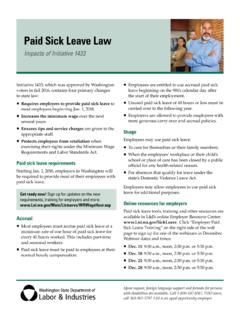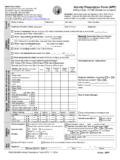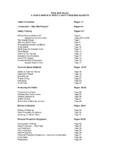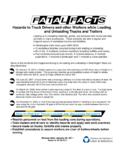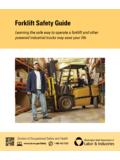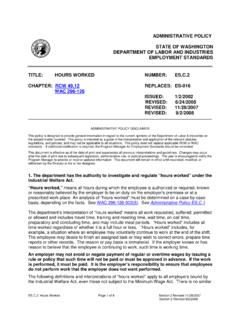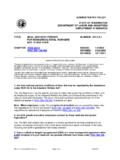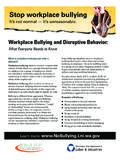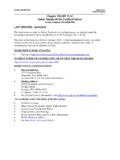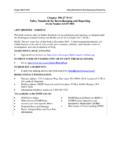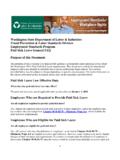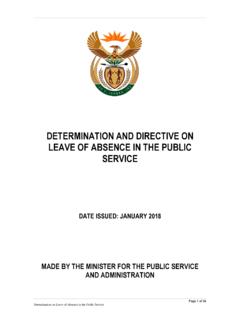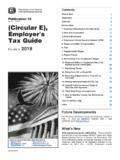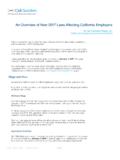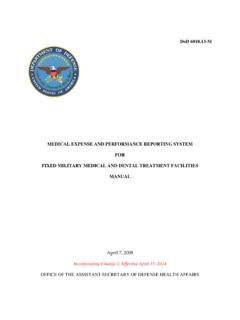Transcription of Paid Sick Leave Rules (Effective January 1, 2018)
1 paid sick Leave Rules ( effective January 1, 2018 ). In 2017, the Washington State Department of Labor & Industries (L&I) worked with stakeholders to develop administrative Rules to carry out, implement, and enforce the provisions of Initiative Measure No. 1433. The Rules were developed in two phases: (1). Rules for employer requirements and employee rights; and (2) Rules for L&I's enforcement of the new law. The Rules for employer requirements and employee rights were finalized on October 17, 2017, and are provided below. The Rules for L&I's enforcement of the new law will be finalized in December 2017. WAC 296-128-010 (new language underlined). Records required. For all employees who are subject to RCW , employers shall be required to keep and preserve payroll or other records containing the following information and data with respect to each and every employee to whom said section of said act applies: (1) Name in full, and on the same record, the employee's identifying symbol or number if such is used in place of name on any time, work, or payroll records.
2 This shall be the same name as that used for Social Security record purposes;. (2) Home address;. (3) Occupation in which employed;. (4) Date of birth if under eighteen;. (5) Time of day and day of week on which the employee's workweek begins. If the employee is part of a workforce or employed in or by an establishment all of whose workers have a workweek beginning at the same time on the same day, a single notation of the time of the day and beginning day of the workweek for the whole workforce or establishment will suffice. If, however, any employee or group of employees has a workweek beginning and ending at a different time, a separate notation shall then be kept for that employee or group of employees;. (6) Hours worked each workday and total hours worked each workweek (for purposes of this section, a "workday" shall be any consecutive twenty-four hours);. (7) Total daily or weekly straight-time earnings or wages; that is, the total earnings or wages due for hours worked during the workday or workweek, including all earnings or wages due during any overtime worked, but exclusive of overtime excess compensation.
3 (8) Total overtime excess compensation for the workweek; that is, the excess compensation for overtime worked which amount is over and above all straight-time earnings or wages also earned during overtime worked;. (9) Total additions to or deductions from wages paid each pay period. Every employer making additions to or deductions from wages shall also maintain a record of the dates, amounts, and nature of the items which make up the total additions and deductions;. (10) Total wages paid each pay period;. (11) Date of payment and the pay period covered by payment;. (12) paid sick Leave accruals each month, and any unused paid sick Leave available for use by an employee;. (13) paid sick Leave reductions each month including, but not limited to: paid sick Leave used by an employee, paid sick Leave donated to a co-worker through a shared Leave program, or paid sick Leave not carried over to the following year ("year" as defined in WAC 296-128-620(6)).
4 (14) The date of commencement of his or her employment, as defined in WAC 296- 128-600(2);. (15) Employer may use symbols where names or figures are called for so long as such symbols are uniform and defined. WAC 296-128-600. Definitions. (1) "Absences exceeding three days" means absences exceeding three consecutive days an employee is required to work. For example, assume an employee is required to work on Mondays, Wednesdays, and Fridays, and then the employee uses paid sick Leave for any portion of those three work days in a row. If the employee uses paid sick Leave again on the following Monday, the employee would have absences exceeding three days. (2) "Commencement of his or her employment" means no later than the beginning of the first day on which the employee is authorized or required by the employer to be on duty on the employer's premises or at a prescribed workplace. (3) "Department" means the department of labor and industries.
5 (4) "Director" means the director of the department of labor and industries, or the director's authorized representative. (5) "Employee" has the same meaning as RCW (3). (6) "Employer" has the same meaning as RCW (4). (7) "Frontloading" means providing an employee with paid sick Leave before it has accrued at the rate required by RCW (1)(a). (8) "Health-related reason" means a serious public health concern that could result in bodily injury or exposure to an infectious agent, biological toxin, or hazardous material. Health-related reason does not include closures for inclement weather. (9) "Hours worked" shall be interpreted in the same manner as WAC 296-126- 002(8). (10) "Normal hourly compensation" means the hourly rate that an employee would have earned for the time during which the employee used paid sick Leave . For employees who use paid sick Leave for hours that would have been overtime hours if worked, employers are not required to apply overtime standards to an employee's normal hourly compensation.
6 Normal hourly compensation does not include tips, gratuities, service charges, holiday pay, or other premium rates, unless the employer or a collective bargaining agreement allow for such considerations. However, where an employee's normal hourly compensation is a differential rate, meaning a different rate paid for the same work performed under differing conditions ( , a night shift), the differential rate is not a premium rate. (11) "Regular and normal wage" has the same meaning as normal hourly compensation. (12) "Separation" and "separates from employment" mean the end of the last day an employee is authorized or required by the employer to be on duty on the employer's premises or at a prescribed workplace. (13) "Verification" means evidence that establishes or confirms that an employee's use of paid sick Leave is for an authorized purpose under RCW (1)(b) and (c). (14) "Workweek" means a fixed and regularly recurring period of one hundred sixty- eight hours, or seven consecutive twenty-four hour periods.
7 It may begin on any day of the week and any hour of the day, and need not coincide with a calendar week. WAC 296-128-610. Requirements for a written policy Duty of the department to provide sample policies. Where these Rules set forth requirements for an employer to have a written policy (WAC 296-128-650(3), 296-128-660(2), 296-128-710(2), and 296-128-730(4)), the department shall, in consultation with employee and employer representatives, develop sample policies which meet the department's standard for compliance with these Rules . The department shall make such sample policies available on the department's web site. WAC 296-128-620. paid sick Leave accrual. (1) Employees accrue paid sick Leave for all hours worked. An employee must accrue at least one hour of paid sick Leave for every forty hours worked as an employee. Employers may provide employees with a more generous paid sick Leave accrual rate. (2) paid sick Leave for employees who are employed on or before January 1, 2018 , will accrue for all hours worked beginning on January 1, 2018 .
8 Employees hired after January 1, 2018 , begin accruing paid sick Leave upon the commencement of his or her employment. (3) Employers are not required to allow employees to accrue paid sick Leave for hours paid when not working. For example, employers are not required to allow employees to accrue paid sick Leave during vacation, paid time off, or while using paid sick Leave . (4) Employers must allow employees to carry over at least forty hours of accrued, unused paid sick Leave to the following year. If an employee carries over forty hours of unused paid sick Leave to the following year, accrual of paid sick Leave in the subsequent year would be in addition to the forty hours accrued in the previous year and carried over. (5) Employers may cap carryover of accrued, unused paid sick Leave to the following year at forty hours. Employers may allow for a more generous carryover of accrued, unused paid sick Leave to the following year.
9 (6) "Year," for purposes of this section, means calendar year, fiscal year, benefit year, employment year, or any other fixed consecutive twelve-month period established by an employer policy or a collective bargaining agreement, and used in the ordinary course of the employer's business for the purpose of calculating wages and benefits. Unless otherwise established by the employer, the default definition of "year" is calendar year. WAC 296-128-630. paid sick Leave usage. (1) An employee is entitled to use paid sick Leave for the authorized purposes outlined in RCW (1)(b) and (c). (2) An employee is entitled to use accrued, unused paid sick Leave beginning on the ninetieth calendar day after the commencement of his or her employment. Employers may allow employees to use accrued, unused paid sick Leave prior to the ninetieth calendar day after the commencement of his or her employment. (3) Beginning on the ninetieth calendar day after the commencement of his or her employment, employers must make accrued paid sick Leave available to employees for use in a manner consistent with the employer's established payment interval or Leave records management system, not to exceed one month after the date of accrual.
10 (4) Unless a greater increment is approved by a variance as provided by WAC 296- 128-640, employers must allow employees to use paid sick Leave in increments consistent with the employer's payroll system and practices, not to exceed one hour. For example, if an employer's normal practice is to track increments of work for the purposes of compensation in fifteen-minute increments, then an employer must allow employees to use paid sick Leave in fifteen-minute increments. WAC 296-128-640. Variance from required increments of paid sick Leave usage. (1) The department shall grant a variance from the increments required by WAC 296-128-630(4) for "good cause." Good cause means situations where an employer can establish that compliance with the requirements for increments of use are infeasible, and that granting a variance does not have a significant harmful effect on the health, safety, and welfare of the involved employees.
